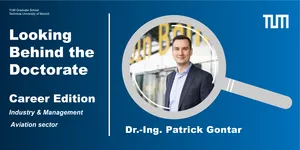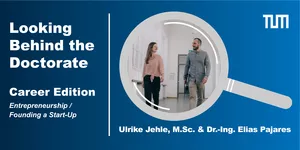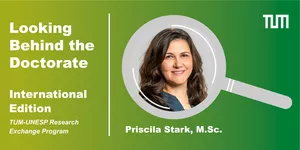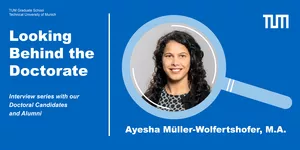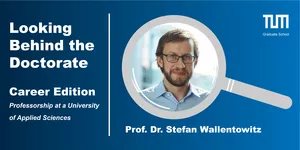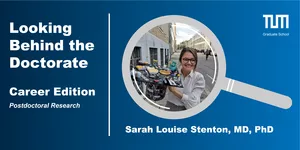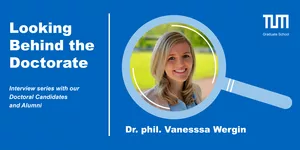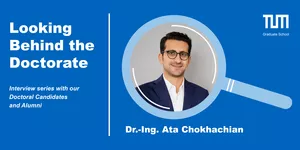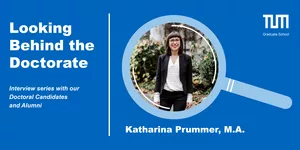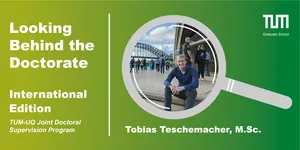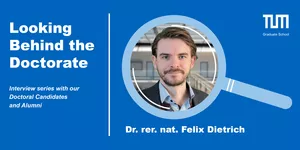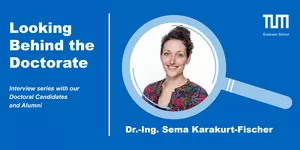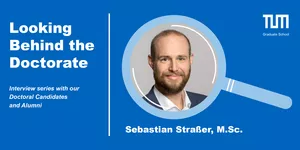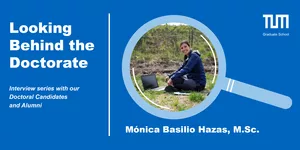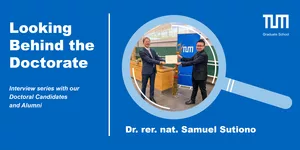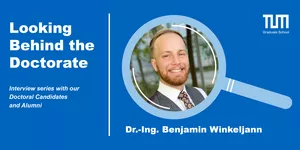Looking Behind the Doctorate – New Interview Series
A doctorate is a unique experience to be shaped by each single doctoral candidate in his*her own way. This is why we created the new interview series “Looking Behind the Doctorate” – talking with doctoral candidates and alumni about their personal experiences, decisions, challenges, learnings as well as hopes and plans for the future. Additionally, we discussed research topics, ranging from sustainable water management to strategies to combat medical device associated complications. You can read all of our interviews on our LinkedIn channel and learn more about the persons behind the doctorate. Here, you find an overview of all interviews that have been published so far.
Follow us on LinkedIn to stay tuned and do not miss out any updates.
Dr.-Ing. Patrick Gontar
For this career edition of Looking Behind the Doctorate, we spoke with TUM-GS alumnus Dr. Patrick Gontar, who today is director of the Airport Operation Control Center (AOCC) at Cologne/Bonn Airport (CGN). During his doctoral research at the Chair of Ergonomics, TUM School of Engineering and Design, he delved into the training and performance of airline pilots. In addition to discussing his research and the latest developments in the aviation sector, we explored the various phases of his career journey, insights gained from his research stay at the NASA Ames Research Center in the Silicon Valley, and the importance of genuine mentorship: “Don’t seek for a mentor who you know likes your research. Rather find someone who challenges your ideas, your results, and your conclusion."
Ulrike Jehle, M.Sc. and Dr.-Ing. Elias Pajares
For this career edition of Looking Behind the Doctorate, we spoke with our doctoral candidate Ulrike Jehle, M.Sc. and TUM-GS alumnus Dr.-Ing. Elias Pajares who co-founded the start-up “Plan4Better”, aiming to contribute to the sustainable design of cities and regions. Both hold a master’s degree from TUM in Environmental Engineering and conducted research at the Chair of Urban Structure and Transport Planning, TUM School of Engineering and Design (ED). Are you thinking about starting your own business as well? We asked Ulrike and Elias what advice they can give and what skills you need to build a successful startup: Ulrike: "A lot of motivation, belief in your idea or product, openness to innovation and a lot of time are essential."
Elias: "One important thing is to strengthen your network from the very beginning. During your doctorate, everyone opens doors for you, people have a lot of trust in you, and it is a good time to build relationships that will benefit you later on, for example as colleagues or clients."
Priscila Stark, M.Sc.
Priscila Weruska Stark da Silva is a doctoral candidate at the Chair for Strategic Landscape Planning and Management, TUM School of Engineering and Design (ED). In her research, she focuses on urban climate and sustainable architecture. After twelve years of experience as a professional architect in São Paulo, she decided to return to academia: "It is also about upgrading your way of thinking. Twenty years ago, we were not discussing sustainability – but now we have new demands that have to be addressed and new possibilities how to solve these problems."
Ayesha Müller-Wolfertshofer, M.A.
Ayesha Mueller-Wolfertshofer is a doctoral candidate at the Professorship of Urban Design, TUM School of Engineering and Design (ED), and newly elected second Graduate Council speaker. In her research, Ayesha focuses on informal settlements or so-called 'slums' in Mumbai, India. Specifically, she looks at how hybrid planning can be implemented in current redevelopment processes of informal settlements, taking into account the needs of residents. Reflecting on how she came up with the topic, she recounts her first visit to an informal settlement: "It was a life-changing moment for me. All the misconceptions and fears I had about this place went away [...]. After this experience, I knew this could not be it and I wanted to go deeper, so the doctorate was the chance for me to dive in."
Prof. Dr. Stefan Wallentowitz
In this career edition, we focus on another exciting career opportunity in academia that many doctoral candidates might not be aware of - a professorship at a University of Applied Sciences (UAS).Prof. Dr. Stefan Wallentowitz, TUM-GS alumnus and professor in Computer Engineering and Computer Architecture at Hochschule München UAS shared his insights and experiences with us. Learn more about the application process, the job profile as well as requirements for applicants: "The most important requirement is that you love teaching. Contrary to university professors, we have double as much teaching obligation and if you do not like teaching, that is pretty much not the job for you - to be frank. Besides that, there are two formal requirements. For one, you need a doctoral degree, or alternatively an evaluation by university professors that you have worked equivalently, but I think that this is a very rare case. [...] Additionally, you need five years of work experience, including three years outside of academia."
Sarah Louise Stenton, MD, PhD
Sarah Louise Stenton, MD, PhD, TUM-GS alumna and postdoctoral researcher at the Boston Children's Hospital and Broad Institute of MIT and Harvard. In her research, she focuses on the diagnosis of rare mitochondrial diseases and aims to end the diagnostic odyssey for affected individuals and their families. Among other things, we talked about her background as a medical doctor in the UK, her decision to pursue a doctorate in Germany and to eventually apply for a postdoctoral position. Learn more about her professional path and the role of mentoring in her scientific career: "At this point in my career, it was important to reach out to a prospective mentor whose career path I would potentially seek to follow".
Dr. phil. Vanessa Wergin
In our latest interview, we talked with TUM-GS alumna Dr. Vanessa Wergin, postdoctoral researcher in the field of sport psychology at the University of Queensland in Brisbane, Australia. Her current research builds on her dissertation on collective team collapse in sports teams. Among other things, we talked about her background as a professional athlete in artistic roller skating, her experiences as a Science Slammer and her new home, Australia. "This was an important learning for me: You should definitely do what you want to do, but also do it where you want to be. I see many people moving around to places they do not like just because of a job offering. I mean, nobody will give this time back to you, so make sure to spend it at a place you like".
Dr.-Ing. Ata Chokhachian
We are happy to share our latest interview with Dr. Ata Chokhachian, researcher and entrepreneur in the fields of building technology and urban climate, who has recently received his doctoral degree at the TUM Chair of Building Technology and Climate Responsive Design. In his research, he adresses the urging topic of climate change while focusing on the human itself: "It is not only about climate anymore when you think about how human physiology works to compensate for different environmental extremes." This May, we experienced a new temparature record of 32 °C in Munich, which underlines the importance of creating comfortable outdoor spaces during extreme weather conditions. Learn more about the topic as well as Ata's career path and experiences as a co-founder of a Startup.
Katharina Prummer, M.A.
Katharina Prummer is a doctoral candidate and project manager in the field of vocational education and training. For her dissertation project, she worked in an intercultural project in cooperation with the University of Pretoria, South Africa. Because of her interdisciplinary profile and various career stations in management and education, we asked about her motivation to always try something new: "Lifelong learning is what many people in the area of education live by. I like change, and I like to learn from my colleagues with backgrounds in other fields of research. [...] I do not think it is a downside if you ask people for help or advice, even though you show them a more vulnerable side."
Tobias Teschemacher, M. Sc.
As a doctoral candidate at TUM, you have numerous possibilities to go abroad. Tobias Teschemacher chose the TUM-UQ Joint Doctoral Supervision Program and spent one and a half years at the The University of Queensland in Australia. He shares his experiences from his time in Brisbane and encourages researchers to plan a longer stay abroad to get the most out of it: "When visiting an unknown country, you need some time to get to know the place and the people. Otherwise, before you have had a chance to finish what you planned to do, you would have to go back." Do you want to learn more about the program? Read the full interview and find more information on our website.
Dr. rer. nat Felix Dietrich
TUM-GS alumnus Felix Dietrich leads a research group on the analysis of machine learning algorithms as part of the Emmy Noether program. He shares his experiences from the prestigious Johns Hopkins University and Princeton. Also, he emphasizes why researchers should engage in personal branding as well as science communication: "Science communication is not only a duty that comes with the profession of a scientist, but it also gives you the chance to brand your academic profile and share the knowledge you have."
Dr.-Ing. Sema Karakurt-Fischer
TUM-GS alumna Sema Karakurt-Fischer is a posdoctoral researcher and part of the prestigious Schmidt Science Fellows. During her doctorate, she assessed the impacts of conventional wastewater treatment on drinking water sources and developed a low-cost technology for a more sustainable water management. We talked about her international and interdisciplinary research profile, as well the topic of work-family-life-balance as a female researcher: "I did not know that many examples of successful female researchers who also have a child and still make it. Knowing that there are people who can manage it takes many worries away from you."
Sebastian Straßer, M.Sc.
Sebastian Straßer, first speaker of the TUM Graduate Council, writes his dissertation on the simulation of electromagnetic fields. We talked about his research, his voluntary work for the Graduate Council and his personal career decisions. After an apprenticeship as an electrician, Sebastian knew that he wanted to take a deeper look into theory. Now probably in his final year of the doctorate, he encourages young researchers to follow their passion and try new things: “Make decisions even if you do not know the outcome. Do not be limited by the fear to fail, you should just feel free to try."
Mónica Basilio Hazas, M.Sc.
Doctoral candidate and former Graduate Council vice speaker Mónica Basilio Hazas is doing her research in the area of environmental engineering on groundwater modeling. Among other topics, we talked about her love for nature, field research and her international profile. So far, she studied and worked in Mexico, the U.S., France, Denmark and Germany. Mónica encourages every doctoral candidate to broaden their horizon: “The key to understanding different people is getting to know their cultures."
Dr. rer. nat. Samuel Sutiono
TUM-GS alumnus Samuel Sutiono, award winner of the international renowned Dimitris N. Chorafas prize, wrote his dissertation on the development of biocatalysts for the production of chemicals. Now a biotechnical researcher working as a project leader at a startup company, Samuel talks about his change to industry, the importance of thinking outside of the box and the surprising factors of science: "The most exciting part of my research is discovering something I did not predict before."
Dr.-Ing. Benjamin Winkeljann
For his dissertation on the topic of on new strategies to combat medical device associated complications, Benjamin Winkeljann was awarded the international renowned Dimitris N. Chorafas prize. We talked about his research, important skills for doctoral candidates as well as his experiences as an interdisciplinary researcher: "People were looking at me strangely when I told them that I started working at the institute of pharmacy being a mechanical engineer. I think this is because we are sadly still too fixed on disciplines."
